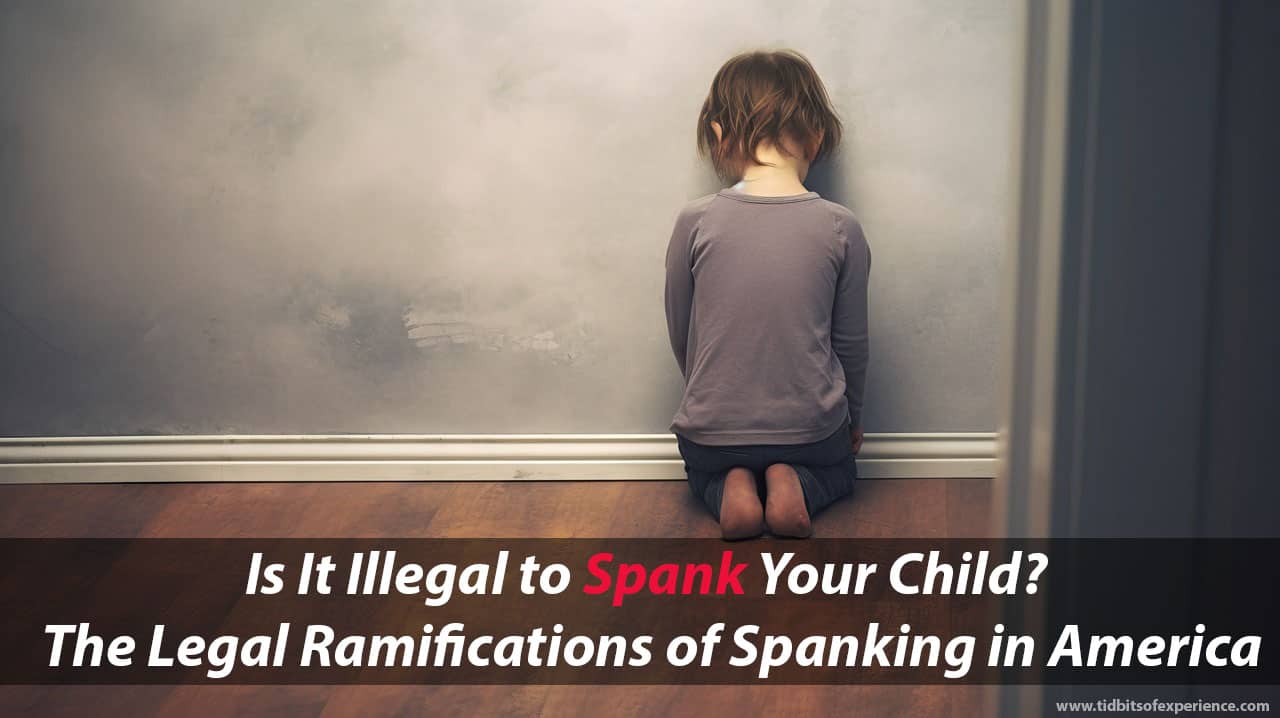As a parent, discipline is an essential aspect of raising well-behaved and respectful children. However, when it comes to spanking as a form of discipline, its legality, and appropriateness often spark debates.
Many parents ask, “Is it illegal to spank your child?” This comprehensive guide will explore the legal perspectives surrounding spanking in various states and analyze potential criminal consequences for parents who choose this method of punishment.
Additionally, we will discuss alternatives that promote more effective disciplinary measures without involving physical force.
Key Takeaways
Spanking is legal in most states as long as it falls within the boundaries of “reasonable force.”
If spanking crosses the line into excessive or abusive punishment, parents may face criminal charges and child welfare proceedings.
Effective alternatives to physical discipline include time-outs, positive reinforcement, and clear communication with respect and consistency.
Many states have outlawed spanking in schools, daycare, foster homes, and institutions for children.
Table of Contents
Understanding The Legality Of Spanking

Parents have a limited right to discipline their children, but state laws vary on what constitutes reasonable discipline and whether corporal punishment is allowed.
Parent’s Limited Right To Discipline
As parents, you have the right to discipline your children in a reasonable manner. This limited right is essential in setting boundaries for behavior and instilling values.
However, it’s crucial to understand that this right has its limits and must be exercised responsibly.
Each state may have varying laws on what constitutes “reasonable” discipline, making it vital for parents to familiarize themselves with their respective local regulations.
In some extreme instances of improper discipline leading to injury or emotional harm, child protection agencies can intervene and take administrative actions such as issuing warnings or removing the child from the home.
State Laws On Reasonable Discipline
When it comes to disciplining your child, it is important to know and understand the state laws regarding reasonable discipline. Each state has its own set of laws and definitions, so familiarizing yourself with your particular state’s laws is crucial. The table below provides a summary of various state laws on reasonable discipline to help guide you as a parent.
| State | Lawful Reasonable Discipline |
|---|---|
| Alabama | Parents may use reasonable and appropriate physical force to discipline their child, as long as it does not cause serious physical injury. |
| California | Parents may use reasonable force to discipline their child, but any force that is likely to cause great bodily injury is considered excessive and unlawful. |
| Florida | Parents may use reasonable and necessary force to maintain authority and discipline their child, as long as it does not cause significant harm or risk of harm. |
| Illinois | Parents may use reasonable force to discipline their child, as long as it does not cause physical harm beyond temporary pain or discomfort. |
| New York | Parents may use reasonable force to discipline their child, as long as it does not cause physical harm, injury, or substantial risk of harm. |
| Ohio | Parents may use reasonable force to discipline their child, as long as it does not cause substantial risk of serious physical harm, disfigurement, or extreme pain. |
| Texas | Parents may use reasonable force to discipline their child, as long as it does not cause or risk causing bodily injury, disfigurement, or mental or emotional harm. |
Please note that this table is not comprehensive, and it is essential to consult your specific state’s laws or an attorney for further information and guidance.
The Line Between Spanking And Abuse

Defining reasonable force and distinguishing it from child abuse is crucial in understanding the legality of spanking.
Defining Reasonable Force
Defining reasonable force in the context of spanking can be quite challenging, as it isn’t always clear what constitutes an acceptable level of punishment.
Reasonable force typically refers to using only the amount of physical discipline necessary to correct the child’s behavior without causing injury or extreme discomfort.
However, it is essential for parents to acknowledge that each state has its own definition of reasonable force when it comes to corporal punishment, and these definitions may vary significantly.
Examples Of Discipline That Led To Criminal Charges
Spanking may be considered criminal and lead to charges of child abuse, assault, or battery. Here are some examples of discipline that led to criminal charges:
- A father in Texas was charged with injury to a child for leaving bruises on his daughter’s behind after paddling her.
- A mother in Massachusetts lost custody of her children after spanking them with a plastic ruler, causing bruising and marks.
- An NFL player, Adrian Peterson, was charged with reckless or negligent injury to a child after using a switch to discipline his son and causing injuries all over the body.
- A daycare provider was sentenced to six months in jail for repeatedly hitting a toddler with a wooden paddle.
It is important for parents to understand their legal limits when it comes to disciplining their children. While spanking may seem like a quick solution, it can result in serious consequences. It is important to explore alternative methods of discipline that do not involve physical pain or discomfort.
Criminal Consequences Of Spanking
Spanking can lead to criminal charges, such as assault or battery, depending on the severity and intent of the punishment.
Possible Charges For Spanking
Parents need to understand that using unreasonable force against their children, including spanking, can result in criminal charges. Here are some possible charges for spanking:
- Assault: A parent can be charged with assault if they cause bodily injury to their child. Depending on the severity of the injury and other factors, this charge can range from a misdemeanor to a felony.
- Battery: This charge is similar to assault but requires physical contact that causes harm or offensive touching without consent.
- Child Abuse: If the discipline goes beyond reasonable force and causes physical or emotional harm, it can lead to child abuse charges. Penalties for child abuse vary by state and can result in fines, probation, jail time, or loss of custody.
- Domestic Violence: When spanking becomes a pattern of behavior that involves controlling or violent acts towards family members, it could be considered domestic violence. Charges for domestic violence depend on the severity of the offense and whether there are prior offenses.
It is crucial for parents to be aware that spanking can cross the line into abusive behavior and has serious consequences. Seeking guidance from a criminal defense attorney may help parents understand what constitutes reasonable discipline and avoid facing criminal charges.
Criminal Penalties For Spanking
Parents must be aware of the potential criminal penalties they may face if their actions are deemed excessive or unreasonable when disciplining their child. The table below outlines these penalties based on potential charges. Remember, the line between physical punishment and abuse can be blurred, so use common sense and look to the law for guidance.
| Charge | Potential Penalties |
|---|---|
| Assault | Possible jail time, fines, probation, community service, and a criminal record. |
| Battery | Potential jail time, fines, probation, community service, mandatory anger management classes, and a criminal record. |
| Child Abuse | Varies by state, but may include jail or prison time, fines, probation, counseling, and loss of custody or visitation rights. |
| Domestic Violence | Jail or prison time, fines, probation, mandated counseling and treatment programs, and loss of custody or visitation rights. |
| Repeat Offenders | Felony penalties, including extended prison sentences and increased fines, even if the current offense is a misdemeanor. |
Keep in mind that these penalties can have a significant impact on you and your family’s life. It’s crucial to act responsibly and consider alternatives to spanking when disciplining your child.
Additional Consequences: Child Protection Or Welfare Proceedings
If your spanking results in serious injury to your child, you could face criminal charges and possible jail time. In addition, the state may initiate child protection or welfare proceedings against you.
Child protection workers would investigate the incident and provide services to the family as needed.
It’s important to understand that while parents have limited rights to discipline their children, those rights do not extend to causing harm or serious injury. The negative effects of spanking can be long-lasting for both the child and parent, including emotional trauma and damaged relationships.
[Keywords: spanking, criminal charges, jail time, child protection proceedings, harm, alternative discipline strategies]
Spanking In Schools
Many states have outlawed spanking in schools and daycare, and most discourage or prohibit spanking in foster homes and institutions for children.
Laws Regarding Corporal Punishment In Educational Settings
Spanking in schools has been a topic of debate for many years, and it is essential for parents to know the laws regarding corporal punishment in educational settings. The following table outlines the legal status of corporal punishment in schools across different states in the US.
| States Where Corporal Punishment is Permitted | States Where Corporal Punishment is Prohibited |
|---|---|
| Alabama, Arkansas, Arizona, Colorado, Florida, Georgia, Idaho, Indiana, Kansas, Kentucky, Louisiana, Mississippi, Missouri, North Carolina, Oklahoma, South Carolina, Tennessee, Texas, and Wyoming | Alaska, California, Connecticut, Delaware, Hawaii, Illinois, Iowa, Maine, Maryland, Massachusetts, Michigan, Minnesota, Montana, Nebraska, Nevada, New Hampshire, New Jersey, New Mexico, New York, North Dakota, Ohio, Oregon, Pennsylvania, Rhode Island, South Dakota, Utah, Vermont, Virginia, Washington, West Virginia, and Wisconsin |
Parents should note that many states discourage or outlaw spanking in foster homes and institutions for children, and using corporal punishment in a degrading manner is considered unreasonable in all states. As laws and regulations regarding spanking in schools may change, it is crucial for parents to stay informed and communicate with their child’s school about discipline policies. Remember, the use of physical discipline can be controversial, and understanding the laws in your state is essential to protect your child’s rights and well-being.
Can You Spank Someone Else’s Child?
As a general rule, it is not appropriate to spank someone else’s child. If you feel that another child needs discipline or correction while in your care, it is best to speak with the child’s parents about how they handle those situations and follow their lead.
However, there are legal considerations when disciplining someone else’s child. It could potentially result in charges of assault or battery if the force used was considered unreasonable or caused injury.
Remember that effective discipline techniques do not necessarily involve physical punishment. There are many alternative methods, such as time-outs, communication, and consistency, that can teach children right from wrong without resorting to physical pain or discomfort.
Alternatives To Spanking

Effective discipline strategies can replace spanking as a way to modify behavior and teach children responsibility, respect, and self-control.
Effective Discipline Strategies
Parents need to understand that discipline doesn’t always mean punishment. Sometimes a simple change in approach can be more effective. Below are some alternative discipline strategies that can help you address your child’s behavior and promote positive development:
- Time-outs – This technique involves removing the child from the situation for a short period, usually one minute per year of age, to calm down and reflect on their actions.
- Communication – Take time to talk and listen to your child, explaining why certain behaviors are not acceptable and discussing ways to improve them.
- Consistency – Children thrive on routine, so setting clear rules with consistent consequences helps them better understand boundaries.
- Positive reinforcement – Praising good behavior is effective in encouraging children to continue making positive choices.
- Natural consequences – Allowing children to face the natural consequences of their actions can be a powerful learning opportunity.
- Use of family meetings – Family meetings provide an opportunity for parents and children to come together regularly for discussions, problem-solving, and decision-making.”
By implementing these techniques instead of spanking or hitting your child, you will foster a healthier relationship with them while promoting positive outcomes in their development. Research shows that non-violent forms of discipline can lead to better academic performance and fewer emotional and behavioral problems in children.
Research On The Negative Effects Of Spanking
Studies have shown that spanking can lead to negative consequences for children. Children who are spanked may experience increased aggression, mental health problems, and lower academic achievement.
Moreover, physical discipline, such as spanking, has been linked to an increase in child abuse cases. In fact, research shows that parents who use corporal punishment on their children are more likely to become abusive towards them.
Overall, disciplinary methods should aim at teaching desirable behavior through effective communication and respect rather than punishment-based approaches.
Obtaining Legal Assistance
If you find yourself facing legal consequences for spanking your child, it is crucial to seek legal assistance immediately. A criminal defense attorney can help you understand the charges against you and represent you in court.
Additionally, some states have discipline guidelines that outline what constitutes reasonable force when disciplining a child.
Remember that just because spanking is not explicitly illegal in some states does not mean it’s without consequences.
It’s important to educate yourself on alternatives to corporal punishment as well as the legality surrounding physical discipline.
Frequently Asked Questions About Whether It’s Illegal To Spank Your Child
Is it legal to spank your child in the United States?
In most states, spanking is not considered illegal as long as it does not result in serious physical harm or injury to the child. However, it is important for parents to understand that there are alternative discipline methods available that do not involve physical punishment.
What are some of the consequences of spanking a child?
Spanking can lead to negative long-term effects on a child’s mental health and behavior, including increased aggression, anxiety, and depression. Additionally, studies have shown that children who experience physical punishment may develop lower self-esteem and overall poorer relationships with their parents.
What alternatives should I consider instead of spanking my child?
Alternatives for discipline include positive reinforcement methods such as rewarding good behavior and taking away privileges when inappropriate actions occur. Other options include modeling appropriate behavior yourself and using timeouts or redirecting your child’s attention towards more positive behaviors instead.
When should I seek professional help if I am struggling with disciplining my child?
It is important to seek professional help if you find yourself consistently relying on physical punishment or feel like you are unable to control your anger while disciplining your child. Seeking counseling can provide support and strategies for effective parenting approaches without resorting only to punitive measures such as spanking.
Conclusion
In conclusion, while spanking is legal in most states, it’s important to understand the legal limits and potential consequences. If a parent crosses the line into excessive or abusive punishment, they may face criminal charges and child welfare proceedings.
However, there are effective alternatives to physical discipline that can maintain discipline without inflicting harm on children. By understanding your rights as a parent and exploring alternative methods of discipline, you can create a healthy and loving environment for your family.
Remember that every child is unique and requires different approaches when it comes to disciplining them.

Is it always abuse if you spank your child naked? I have muscle weakness, and my spankings don’t hurt enough unless I take off my daughter’s (3yo) underwear and use a belt. I never leave a mark.